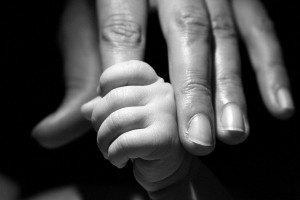Boundaries with Kids
Lisa Velin
Part 1 of a 3-Part Boundaries with Kids Series
 Recently, my four-year-old daughter and I had a powerful learning experience together. While I was in the kitchen cooking dinner, and at the same time attempting to post a cute picture of my girls on Facebook, she was in the dining room trying to get my attention. I kept saying, “Just a minute,” completely distracted by what I was doing. Unbeknown to me, she was at that moment so frustrated by my lack of attentiveness that she was scribbling on a book I had borrowed from a friend. Interestingly enough, it was the book Boundaries with Kids, by Dr. Henry Cloud and Dr. John Townsend.
Recently, my four-year-old daughter and I had a powerful learning experience together. While I was in the kitchen cooking dinner, and at the same time attempting to post a cute picture of my girls on Facebook, she was in the dining room trying to get my attention. I kept saying, “Just a minute,” completely distracted by what I was doing. Unbeknown to me, she was at that moment so frustrated by my lack of attentiveness that she was scribbling on a book I had borrowed from a friend. Interestingly enough, it was the book Boundaries with Kids, by Dr. Henry Cloud and Dr. John Townsend.
My daughter had been trying to ask me for drawing paper, and became angry when I did not respond immediately. When I walked into the dining room to see what she needed, she was playing with Legos and I noticed that my book had scribble marks on it. I exclaimed: “Oh no! Did your sister do this?” as it looked like her writing rather than the writing of a four-year-old. She looked at me and said, somewhat hesitantly, “Yes.” But I could tell, of course, that something was not right and asked: “Who really did this?”
She burst into tears and said, “I did, Mommy. I did it!” What a confession. I was proud at her courage in telling me the truth, and I told her so. As I held her, we discussed the consequences for her (money will be taken out of her allowance) and for me (I will have to buy my friend a new book). I suggested that she knew where the paper was, and that she could easily have got it herself. She explained, “That was not what was frustrating to me, Mommy. All the paper was drawn on. I couldn’t find a clean sheet!” “So we need to go to the store and buy some more drawing paper? You can just let me know that next time, ok?” “Ok.”
Purposeful Parenting
 My hope in this encounter was that she would learn the consequences of her acting out in anger and gain a sense of empowerment to do better in the future. In the book Boundaries with Kids, I read something that has truly challenged my parenting style. The book states that parents tend to “interact with their children in a way that comes naturally to them. We parent in the present without thinking about the future.” My husband is a very involved, and sometimes strict, personality, while I tend to be more laid back and to let the kids figure things out on their own. Our hope is that our styles will complement one another.
My hope in this encounter was that she would learn the consequences of her acting out in anger and gain a sense of empowerment to do better in the future. In the book Boundaries with Kids, I read something that has truly challenged my parenting style. The book states that parents tend to “interact with their children in a way that comes naturally to them. We parent in the present without thinking about the future.” My husband is a very involved, and sometimes strict, personality, while I tend to be more laid back and to let the kids figure things out on their own. Our hope is that our styles will complement one another.
As I read this book, I was challenged to step up my style of parenting by asking myself: “Is what I am doing being done on purpose?” If I am raising my children to be responsible adults, I need to always have an eye on their future. In this example with my daughter (which occurred after I had read the book), I might have been influenced too much by my sense of mercy, and let her just get away with crying and showing genuine remorse about what she did. If I had not given a consequence at all, that might have taught her that to get her way all she has to do is cry. But by taking money out of her allowance, it gives her a sense of discomfort that will hopefully cause her to think before she acts next time.
Christian Counseling for Healthy Parenting
This is just one way the book challenged and encouraged me as a parent and as a Christian counselor. If you would like some help in dealing with parenting issues – whether it is a topic of disagreement between your partner and you, persistent behavioral problems in your children, or an issue that keeps coming up for you personally as you struggle to parent in a Godly and healthy way.
“Mother and Child” courtesy of Ross Griff, Flickr CreativeCommons (CC BY 2.0); “Grasp Reflex,” courtesy of Raul Luna, Flickr CreativeCommons (CC BY 2.0)





